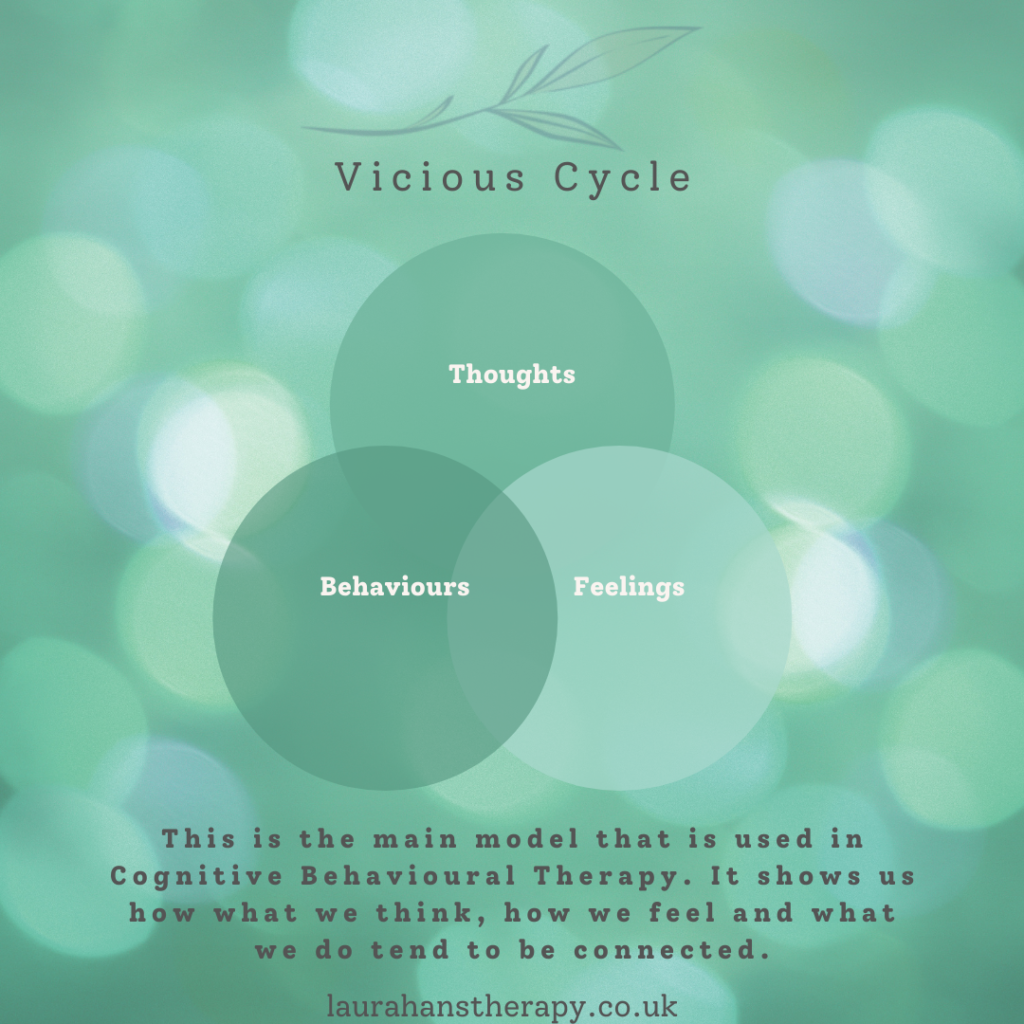What is Cognitive Behavioural Therapy?
Cognitive Behavioural Therapy is a NICE approved psychotherapy used to treat symptoms of anxiety and depression. It is a “doing” therapy which helps you learn practical life skills to help you manage your symptoms of anxiety and depression. In CBT, we look at how the way we think, the way we feel, and what we do tend to be extremely linked. For example, when you feel down, stressed, or anxious, your thoughts and behaviours can change and become unhelpful, which can lead to you getting stuck in what we call vicious cycles.
For instance, when you are feeling low, you may start to lack motivation to do things, such as seeing your friends, going to work, paying bills, or keeping your house clean. This may initially give you a sense of relief that you do not have to face the burdensome activities. However, if you continue to withdraw from life, you miss out on chances to experience pleasure or achievement, meaning you are more likely to stay low. Additionally, by being more inactive, you have more time to sit with your negative thoughts, which will only reinforce how low you are feeling. And so the cycle continues...
How Can CBT Help Me?
CBT can also help you to examine your negative unhelpful thoughts that can also be very common when you are feeling low. Thoughts like, “what’s the point,” “I won’t enjoy it anyway,” or “I’m such a failure,” can reinforce low mood, meaning you are less likely to do pleasurable activities and you ultimately stay stuck in a vicious cycle of depression. By learning to identify these thoughts, and by questioning them more instead of believing them as gospel, you can learn to think in a more compassionate way towards yourself, and your life, which results in a more improved mood.
CBT can help to break these vicious cycles by helping you to firstly notice your own. Knowledge is power and if you don't know what your own unhelpful thoughts and coping strategies look like, you won't know what you need to change. With the help of your therapist, you can learn to identify your own vicious cycles that are keeping you stuck, and then gradually start to make meaningful changes to improve how you feel, and think. Research has shown that this can be a powerful way to improve your symptoms of low mood and anxiety, as well as your quality of life.
With regards to anxiety, you may start to avoid situation/things/people that make you anxious. This makes complete sense because anxiety can be unpleasant to experience, can't it? However, avoidance is never a long-term solution to an anxiety problem, and avoiding things will continue to impact your life and relationships. With this example, CBT can help you start to gradually reduce avoidance and learn to face the things that make you anxious to try and help you reclaim your life and take control back.
What is involved in CBT?
CBT involves “homework,” which is designed to help you practice the skills you have learnt in your sessions. The purpose of the homework tasks is a bit like going to a Physiotherapist to help with a shoulder injury. The Physiotherapist will suggest some exercises for you to do at home to help you overcome your injury. If you practice the exercises, you are more likely to recover. CBT is very similar in that frequent practice of CBT skills lead to a reduction in symptoms of anxiety or depression. If you do not practice the skills, you are unlikely to see an improvement.
A key ingredient for CBT to be effective is motivation to practice your new skills outside of your therapy sessions. Your CBT Therapist will support you with this and eventually, you should notice an improvement in your symptoms leading to you living a life that feels more enjoyable.
How Can I Find a CBT Therapist?
If CBT sounds like it is for you, you can refer yourself to your local Talking Therapies service to ask for an assessment. This is under the NHS, so is free of charge, however, depending on where you live will depend on how long the waiting list is. If you are keen to get started, it may be worth finding a CBT Therapist privately. You can read more about paying for private therapy here.
If you decide to do this, be sure to check your therapist is BABCP accredited. The BABCP is the British Association of Behavioural and Cognitive Psychotherapies and is the lead organisation for CBT in the UK and Ireland. Its purpose is to promote practice, theory, and development of CBT. When a therapist is BABCP accredited, it essentially means they have had the necessary training and clinical experience that is needed by the BABCP to work as an accredited CBT Therapist. You can check this by checking the CBT register (see link below) and typing in your therapists’ surname. If their name is on the register, this means they are BABCP accredited, which will ensure you receive the right evidence-based CBT in your treatment.
I hope this blog has helped to shed some light on what we mean by CBT and what to expect from it. If you wanted to chat with me a bit more, you can book your free consultation here.
Not sure if CBT is for you? Why not download my FREE managing mood guide to give you a little taster of what to expect?
Useful Links
How To Find A Therapist Podcast Episode
